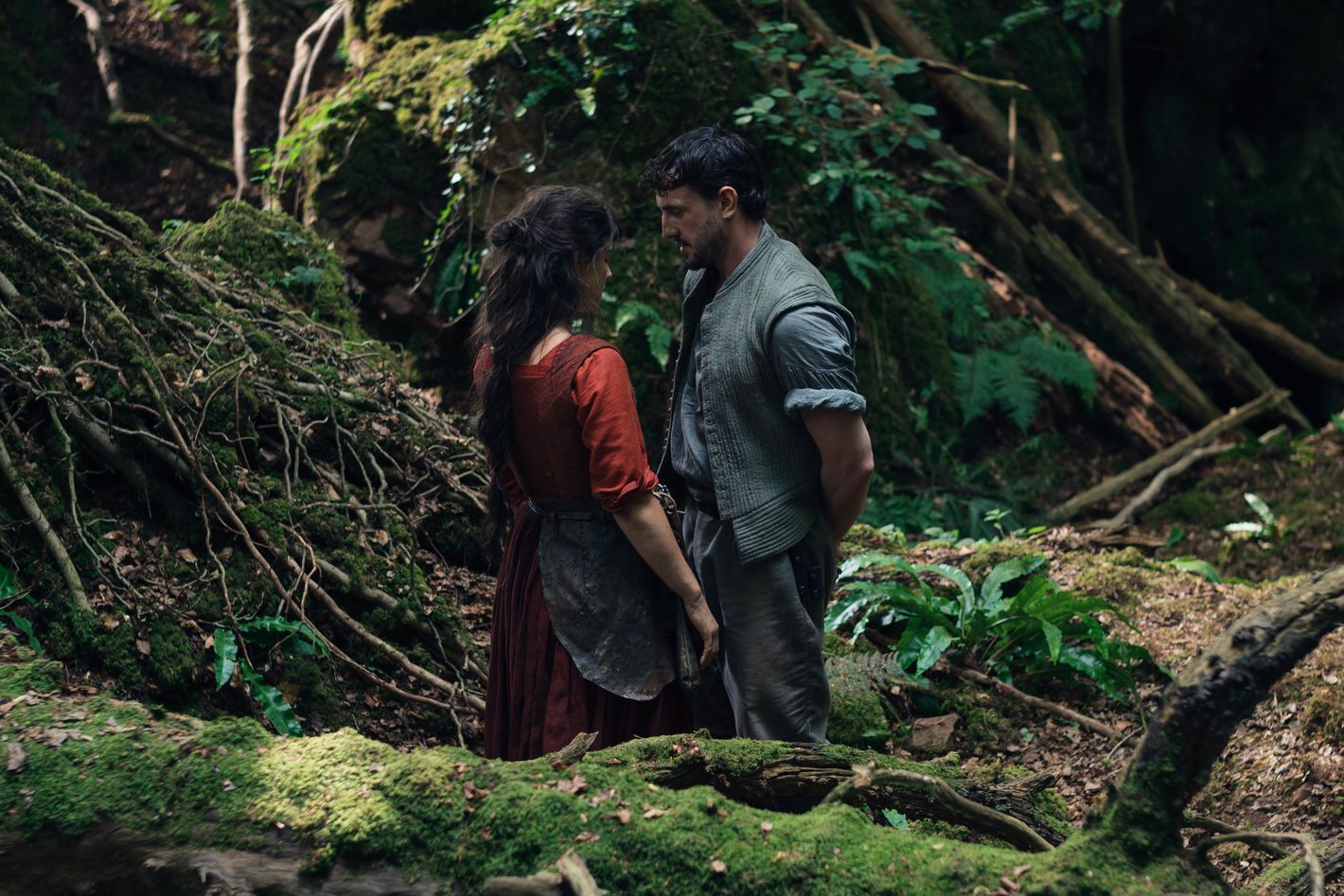
We know next to nothing about William Shakespeare’s only son, Hamnet, other than the fact that he and his twin sister Judith were born sometime in 1585 and that he was buried in August of 1596, 11 years later. Even the cause of death is unknown, though the deaths of young children were not entirely uncommon at the time; three of William’s own sisters had died in childhood. Understandably, the scarcity of our insight into the life of Hamnet and his family has inspired writers and artists over the years to fill in the details with their own imaginings. As an opening quote from Shakespeare scholar Stephen Greenblatt reminds us, in both Maggie O’Farrell’s haunting 2020 novel Hamnet and Chloe Zhao’s new adaptation of it: “Hamnet and Hamlet are in fact the same name, entirely interchangeable in Stratford records in the late sixteenth and early seventeenth centuries.” Which means we know one more thing about this boy: A few years after his death, his father wrote the greatest play in the English language, and it bears his name.
Premiering at the Telluride Film Festival ahead of a November theatrical release, Hamnet is devastating, maybe the most emotionally shattering movie I’ve seen in years. The book was overwhelming, too, and going into a film about the death of a child, one naturally prepares to shed some tears. Still, I did not really expect to cry this much. That’s not just because of the tragic weight of the material, but because the picture reimagines the poetic act of creating Hamlet. Shakespeare’s play sits on the highest shelf, fixed by the dust from centuries of acclaim. It is about as unimpeachable as a work of art can be. And yet, here is a movie that dares to explore its inception. The attempt itself is noble, and maybe a little brazen; that it succeeds feels downright supernatural.
Hamnet remains mostly faithful to the novel (O’Farrell collaborated with Zhao on the screenplay), but the two works center on different parts of the imagined timeline. The book ends with our first glimpse of Hamlet, and its final words belong to the Ghost of the play: “Remember me.” The film, on the other hand, directly grapples with the connections between real life and art, showing how the play (and his own role in it) became a vessel for Will Shakespeare (Paul Mescal) to confront his sorrow and help bring his wife Agnes (Jessie Buckley) out of hers. Hamlet is thought of, not incorrectly, as a work about vengeance and the conflict between thought and action; indeed, it was Shakespeare’s version of an already-existing and popular revenge play. But in shifting her focus, Zhao fully embraces something long evident but often overlooked: As reworked by Shakespeare, Hamlet is also a play about all-consuming grief, one driven at all levels by loss and guilt and questions of how to properly mourn.
It’s a fascinating subject to imagine, but how exactly does one tell a story mired in such unspeakable sadness? Hamnet speculates that the child was a victim of bubonic plague, but it approaches the tragedy with a kind of magical realist sensibility. In this telling, the constitutionally weaker Judith (played by Olivia Lynes in the film) is the one who initially gets sick, and the loving and industrious Hamnet (Jacobi Jupe), who often traded clothes with her as a game to fool their parents, makes one final sacrifice, pretending to be his sickly twin sister and thereby drawing the disease out from her and into himself. Transference is thus at the heart of this story — narratively, formally, structurally.
The novel jumps back and forth in time, but it keeps circling back to Hamnet’s death, as O’Farrell’s garnished prose transmutes a horrific event into something almost unreal, though no less heartbreaking; her efflorescent descriptions of nature capture something uncanny and sinister about the world (not unlike the doomed Ophelia’s florid songs of grief in Shakespeare’s play). Zhao’s film is more linear, so it doesn’t dwell as long on the details of the death itself. Instead, its breathless, queasy energy sweeps us along. Aided immeasurably by Max Richter’s score, Zhao finds melancholy not in stillness and reflection but in movement and activity. We see how young Will, a sensitive and shy Latin tutor, first met the headstrong Agnes, once a child of nature dismissed as “a forest witch” and raised by an uncaring step-mother. Buckley, an actor who can be both ethereal and earthy at the same time, makes an ideal choice for Agnes. This is a woman who doesn’t quite belong in the world and yet seems to have emerged out of its very soil. She loves to lurk in the woods with her pet falcon, she is proficient in herbs and remedies, and she possesses the gift of foresight. Despite her reluctance to get married, Agnes has already seen that at her deathbed she will be surrounded by two children. But she has already had a daughter, Susanna, before Judith and Hamlet arrive, so the eventual birth of three children terrifies her to the core.
Will, the “pasty-faced scholar” hounded for his meekness, sees and loves Agnes for who she is, but marriage and a family also mean a taming of her wild spirits. They are kindred souls: He too can work dark magic, just with his words. Zhao suggests that even though Will was rarely home, his family life fed his art. We see the kids doing the witches’ opening incantations from Macbeth, and of course Hamnet and Judith’s cross-dressing and play-acting echo the plots of many a Shakespeare comedy. All this could come off as corny, but the family is depicted with such loving specificity that we buy all of it. Many historians have been perplexed by how such a seemingly simple man as Shakespeare could have written works of such grandeur and depth. So here, then, is a home filled with wonder and play that could have inspired some of it.
Which, of course, compounds the tragedy. Agnes might have access to certain powers, but she can’t bring Hamnet back. “He can’t have just vanished,” she says. “All he needs is for me to find him. He must be somewhere.” Will simply responds, “We may never stop looking for him.” But the film has already shown us where Hamnet is. As he hovers between life and death, we see a vision of the young boy wandering around a makeshift forest that is clearly a theater backdrop. He then steps into the dark void of a door at stage center, from which Will Shakespeare himself will later emerge, cloaked in white powder, playing the ghost of Hamlet’s murdered father. The undiscovered country is art itself.
We sometimes forget what a phenomenal actor Mescal is. This is probably because he hasn’t made a good action hero yet, which is a scarlet letter in our day and age. But also, we love to quantify, classify, and dilute complicated performers into simple impressions; despite the fact that he’s only been acting in movies for five years, we think we already know what he’s all about. But he’s not really the softboi that’s been memed to meaninglessness. With his unexpected choices in both cadence and affect, he’s something closer to a young Christopher Walken. In Hamnet, his response at the first sight of his dead son represents some of the best acting I’ve ever seen; it’s matched later when he interrupts a rehearsal of Hamlet’s “Get thee to a nunnery” speech and delivers it himself with such snarling self-loathing (“I could accuse me of such things that it were better my mother had not born me!”) that he instantly and convincingly reinterprets the world’s most famous play before our very eyes. Agnes accuses Will of not grieving enough, but Mescal makes sure we see that oceans of pain lie beneath his hesitancy: He is Hamlet. And yes, we do get to see the actor as William Shakespeare reciting Hamlet’s “To be or not to be” soliloquy in this movie, one of two very different interpretations of the same speech that Zhao presents, as if to acknowledge that everyone has their own Hamlet.
It won’t spoil anything to say that Hamnet concludes with a staging of Hamlet, one in which the play’s twisted reflection of the poet’s life becomes more evident and gains complexity. Perhaps the greatest compliment I can pay Zhao is that this recreation of such a familiar work still manages to surprise, because we see it through Agnes’s disbelieving eyes. The drama onstage doesn’t just echo and explain Will’s sorrow, it also serves as a kind of lifeline to Agnes — and when we view Hamlet as an effort by one grieving person to reach out to another, the whole thing opens up in magnificent new ways. There are references to other stories coursing through Hamnet, and one of them is the myth of Orpheus and Eurydice, which Will tells Agnes during one of their first meetings. It’s a tale of resurrection, passion, and art, and how one final longing glance traps a lover in the underworld forever. As presented here, it doesn’t apply in any schematic or obvious way to the drama of Shakespeare’s life. But it does underline a fundamental truth in both Hamnet, and Hamlet: that to see and be seen is a joyous and terrifying thing.
